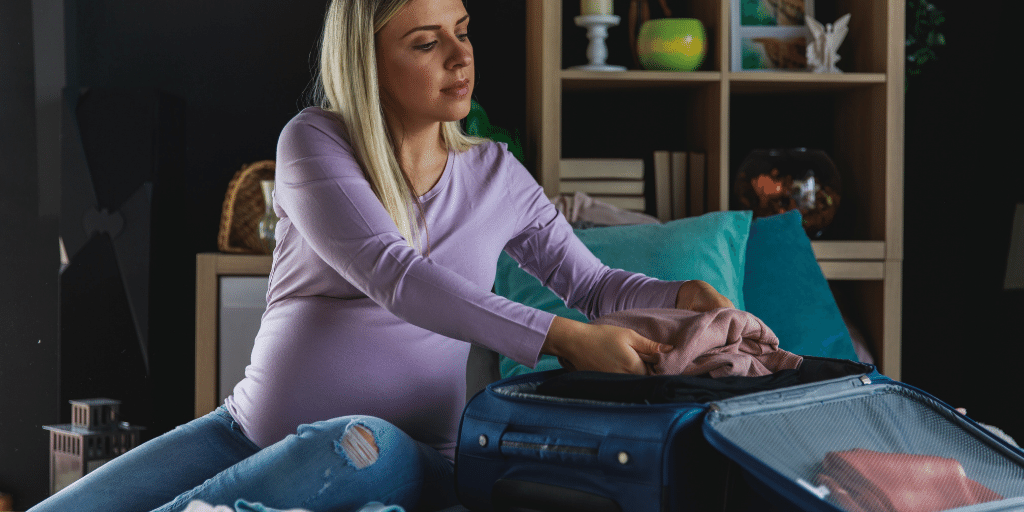Confused by what you’ll need when you go to the hospital to give birth to your baby? Here’s our essential hospital bag checklist.
This guest post comes from a midwife
Midwife Marie says: “There’s so much conflicting information from the internet, companies and sometimes even health care professionals that I thought you might find it useful to have some clarity on what to pack in your hospital bag.
“You should have your bag ready by the 36th week of pregnancy (even if you are having a planned homebirth, in case you need to go into hospital). All information below is in accordance with credible, scientific research and comes via almost a decade of experience in midwifery.”
For your newborn baby
- Diapers. These are on your baby’s skin for the best part of 24 hours a day, seven days a week, so you may want to consider which brand to choose and how this may affect your baby’s skin; many contain chlorine, bleach and chemicals. Each child uses around 8,000 diapers and regular disposables take up to 100 years to degrade. It won’t be you and me that will be faced with the problem of landfill, it will be our children and grandchildren. Biodegradable nappies are a happy medium, containing fewer chemicals and they’re made from natural fibres. They are good both for your baby and the environment. If you are planning on using washable diapers, great!
- Baby wear. Your baby has been in a natural, safe environment in the womb. They have never seen light, heard clear sounds, or felt the sensation of being held skin to skin. Once born, we expose newborns to lots of new stimuli, including chemicals. I recommend that you clothe your baby in organic fabrics for the first four weeks if possible and pre-wash them in natural, non-bio laundry soap. This is kinder to baby skin and helps reduce unnecessary exposure to chemicals, which may cause irritation. A plain cream colour is best; you can boil wash cream clothing to remove poop stains rather than ruin outfit after outfit. Try and opt for babywear that fastens down the front, as it’s so much easier to get on. Finally – a soft hat; your baby will be wet at birth, so we dry them off and then recommend you pop a hat on to keep the heat in.
- Muslins. These are just brilliant and versatile. They can mop up drool, protect your shoulder whilst winding or be used as a little comforter or swaddle.
- Nappy rash cream. Baby’s skin is five times thinner and more permeable than an adult’s and takes four weeks to build up protective skin barriers. I use a simple rule for baby skin creams - if you wouldn’t rub it into your lips or eat it, don’t put it on your new-born baby’s skin. Any products that contain sulphates (SLS and SLES), parabens, phthalates, artificial colours and perfumes will strip the build-up of natural skin barriers and enzymes, increasing the risk of dryness, rashes, eczema and psoriasis. Avoid washing your baby or using fragranced creams for at least four weeks. Use 100% food grade, organic nappy rash cream if required.
- Cotton balls. For the first few days of life, your baby will pass a thick, black, sticky substance called meconium. Using a cold, fragranced baby wipe can cause unnecessary discomfort and strip important skin barriers, so warm water and cotton balls are all you need. Save wipes for later and when you start using them, opt for the most natural, chemical- and fragrance-free products to protect your baby to unnecessary exposure to chemicals.
- Safe mode of transport home. You’ll need an infant car seat to take your baby home from the hospital. Some hospital guidelines recommend that midwives briefly assess your mode of transport to ensure it’s safe before you leave.
- Infant Formula. if you plan to bottle feed your baby, have formula milk ready.
And that’s all you REALLY need for your newborn.
For you
You need a few things to make your life as a new mum as easy and comfortable as possible.
- Toiletries. After meeting your baby and eating something, you’ll want to have a shower. Bring in your regular toiletries and maybe something a little more indulgent like a luxury, relaxing wash. Try to opt for a natural or organic product as you will be a little more sensitive than usual.
- Face cloth. This is ideal for labour, as you will probably get a little hot and sweaty, so a cool cloth will help cool you down. A few drops of lavender oil can help you feel calmer. If you have a Caesarean, you may not be up and walking for a day, so hospital staff can give you a bed bath with your own cloth.
- Soft slippers. To protect your feet from the hospital floor and to warm cold toes. Go for non-slip ones.
- Maternity sanitary pads. You’ll bleed quite heavily after the birth, so choose maternity pads. Opt for natural, chlorine and bleach free pads.
- Nipple cream. The number one reason women stop breastfeeding is because their nipples get sore. Firstly, a good latch is key. Secondly, caring for your nipples is paramount. Get a 100% food-grade organic cream and use it from the first feed. It really helps to protect and heal your nipples.
- Hair ties. You want your hair away from your face so you can breathe properly and keep cool. If you are breastfeeding, tie your hair up so you can see the attachment properly.
- Maternity underwear. Choose real Bridget Jones style underwear because comfort is key after you have had a baby. Make sure they rise up above your belly button encase you need a Caesarean, as if they sit on the incision, it can be really uncomfortable. If you don’t have a Caesarean, your tummy won’t go down right away and it’s nice to have that extra support.
- Night wear. Choose something that means you can breastfeed at night with ease. Get a super soft and comfy top that unbuttons down the front so you can feed without the hassle of getting your top off, or pulling it up and struggling to see.
- Snacks. You’ll need some food for you and your birth partner. Although there are snacks and sandwiches in most hospitals, you’ll want your own favourite snacks with you so you can just help yourself, rather than end up with a sandwich you don’t really fancy. Also, take plenty of drinks to keep you hydrated and your sugar levels up. Pack a mix of water and fruit juice but steer clear of energy drinks as they are packed with caffeine.
- Music. Make a playlist for labour (unless you plan to hypnobirth). Start listening to the playlist during your pregnancy in your favourite room at home. Breathe and focus on the feeling of calmness and being in control. I am always surprised at how many women forget this, when it really does make a difference. The power of music is phenomenal.
- Your antenatal notes. This is key to helping midwives and doctors provide you with good care. It’s got everything we need to know about you, blood test results and pregnancy scans. Without your notes, it’s possible things can get missed as we can’t get the history we need.
- Going home outfit. I am a massive fan of comfy maternity dresses, especially if they tie above your waist and facilitate breastfeeding. They take up less room in your bag, you don’t need to worry about the fit if it’s adjustable, you haven’t got to think about a matching top to go with jeans/trousers, they are airy and don’t rub anywhere that could be sore and they are much easier to get on and off.
That’s all you really need to take with you, hospital rooms are small and if everything goes well, you can go home after six hours. Most women spend one night in hospital and go home the next day. If you do need to stay, then your birth partner can always grab extra bits for you.
Further reading:
See our pick of the ten best Sleeping Sacks
Understanding your baby’s sleep; newborn to three months





